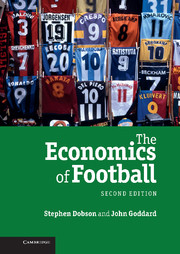Book contents
- Frontmatter
- Contents
- Preface
- Acknowledgements
- List of figures
- List of tables
- 1 Introduction
- 2 The economic theory of professional sports leagues
- 3 Competitive balance, uncertainty of outcome and home-field advantage
- 4 Forecasting models for football match results
- 5 Game theory and football games
- 6 English professional football: historical development and commercial structure
- 7 Determinants of professional footballers' salaries
- 8 Professional footballers: employment patterns and racial discrimination
- 9 The football manager
- 10 The football referee
- 11 Spectator demand for football
- 12 Gambling on football
- 13 Football around the world: France, Germany, Brazil, Japan and China
- 14 The economics of the World Cup
- References
- Index
12 - Gambling on football
Published online by Cambridge University Press: 05 June 2012
- Frontmatter
- Contents
- Preface
- Acknowledgements
- List of figures
- List of tables
- 1 Introduction
- 2 The economic theory of professional sports leagues
- 3 Competitive balance, uncertainty of outcome and home-field advantage
- 4 Forecasting models for football match results
- 5 Game theory and football games
- 6 English professional football: historical development and commercial structure
- 7 Determinants of professional footballers' salaries
- 8 Professional footballers: employment patterns and racial discrimination
- 9 The football manager
- 10 The football referee
- 11 Spectator demand for football
- 12 Gambling on football
- 13 Football around the world: France, Germany, Brazil, Japan and China
- 14 The economics of the World Cup
- References
- Index
Summary
Introduction
The theoretical and empirical economics literature contains numerous studies of the informational efficiency of betting markets. Comprehensive reviews of the earlier literature are provided by Sauer (1998) and Vaughan Williams (1999). Research concerning the relationship between the market prices for bets on the outcomes of sporting contests, and the probabilities associated with these outcomes, forms a subfield within the literature on financial market efficiency. Although much of this literature focuses on racetrack betting, the market for betting on match outcomes in football has also attracted considerable attention. A divergence between the market prices and the true probabilities implies a violation of the conditions for the informational efficiency of the betting market. Any such divergence creates the opportunity for a sophisticated bettor to extrapolate from historical data on match outcomes (or other relevant information), in order to formulate a betting strategy that yields either a positive return, or (at least) a loss smaller than would be expected by an unsophisticated or indiscriminate bettor due to margins or commissions that are built into the odds.
Chapter 12 examines the economics of sports betting, with particular emphasis on the markets for betting on the outcomes of football matches. Section 12.1 reviews the previous literature on this topic, including studies of the informational efficiency of sports betting markets and the phenomenon of favourite-longshot bias.
- Type
- Chapter
- Information
- The Economics of Football , pp. 352 - 379Publisher: Cambridge University PressPrint publication year: 2011



